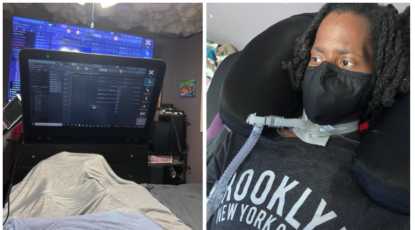-
Mood Lifters: Think of it like ‘Weight Watchers’ for mental health
This proven and peer-led mental wellness program, created by a U-M scientist (and WW success story), seeks to help people who shun or can’t afford traditional therapy. Like the popular weight-loss program, it’s community-based, inexpensive, and — best of all — scaling up.
-
How bedside musicians helped one family cope with tragedy
The Gifts of Art Bedside Music and Art Program at Michigan Medicine is staffed by musicians specially trained in providing acoustic music for patients at the bedside. Artists will go “where patients, families, and staff members need us,” says coordinator Sam Vandiver.
-
Improvements in human genome databases offer a promising future for cancer research
A gene sequencing method called ribosome profiling has expanded our understanding of the human genome by identifying previously unknown protein coding regions. Also known as Ribo-seq, this method allows researchers to get a high-resolution snapshot of protein production in cells.
-
Researchers flash forward with psychedelics at M-PsyC
U-M medical researchers are probing the healing power of 1960s-era hallucinogenic drugs to develop revolutionary treatments for chronic pain, depression, anxiety, psychiatric disorders, and other medical conditions.
-
As Medicaid continues post-pandemic ‘unwinding,’ U-M report cites benefits of expansion
At a pivotal time for Medicaid health coverage for Americans with low incomes, a report on the impacts of Michigan’s Medicaid expansion shows very positive effects, as well as opportunities for continued improvements.
-
Evidence of conscious-like activity in the dying brain
Reports of near-death experiences — with tales of white light, visits from departed loved ones, hearing voices —capture our imagination and are deeply engrained in our cultural landscape. Now a new study reveals intriguing brain wave patterns in comatose patients.
-
Making music with only his eyes
ALS can’t keep Jordan Weston from his lifelong passion for producing music. Through a sensor bar on his tablet, the tobii dynavox I-16 tracks Weston’s eye movements, allowing him to control the music software and build out his songs.
-
Brain health, concussions and sports: Is there a long-term connection?
The Michigan Alumni Brain Health Study will compare cognitive, mood, sleep, pain, and functional outcomes to examine whether sport participation and concussions are associated with later-life brain health in former U-M athletes and nonathletes.
-
The value is inestimable
President Ono reflects on the dark days of the pandemic and celebrates the inestimable value of Michigan Medicine.










